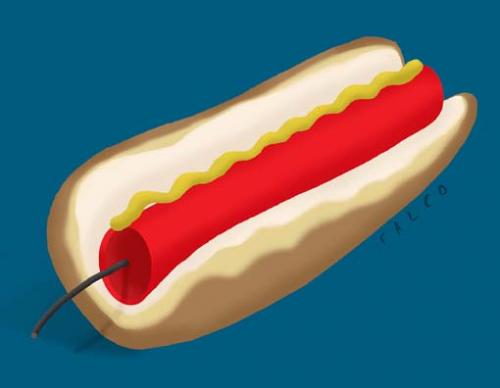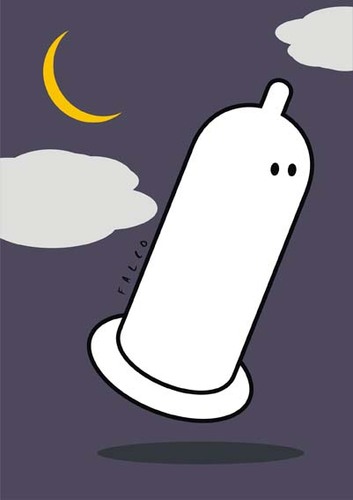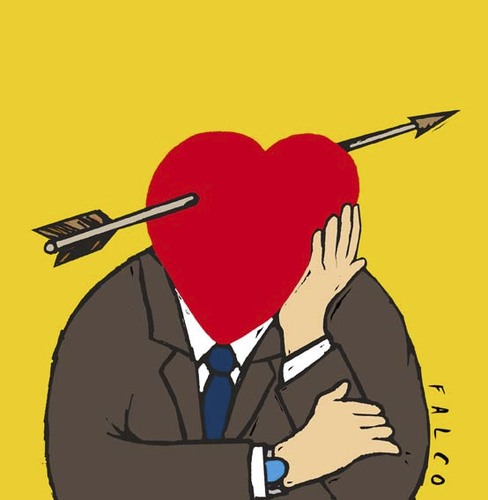![]() Alex, I find it hard to decide whether your works are cartoons or rather illustrations. Where do you see the difference between the two?
Alex, I find it hard to decide whether your works are cartoons or rather illustrations. Where do you see the difference between the two?
In some cases, the distinction is clear. Take, for example, charts and graphs in scientific books – medical ones, architectural ones, etc. They meet requirements that a cartoon couldn’t. Commercial illustration has evolved a lot over the last fifty or sixty years, especially in package and product design. There has been a development in cartoons, too, but it has been more limited.
You could say that illustration is more of a commercial activity . You create something in order to sell it – like posters or magazine covers. The special quality about cartoons is that they contain a definite and explicit narrative. And they often communicate a strong social opinion to a wider audience.
 So you think they are two separate things?
So you think they are two separate things?
I see many points of contact between the two. They are both visual media created for the masses – but this issue is hotly debated with passion on both sides. Personally, I see more contact points than differences. My friend, American illustrator Randy Enos summarized the differences and/or similarities between cartoon and illustration like this:
If you draw a political picture of a duck and you label it “duck”, then you’re a cartoonist.
If you draw a political picture of a duck and you don’t label it “duck”, you’re an illustrator.
If you’ve made a funny cartoon duck for the cover of Time magazine, you’re an illustrator.
If you’ve made a funny cartoon duck for the cover of MAD magazine, you’re a cartoonist.
If you’ve made a funny cartoon duck for the cover of the New Yorker, you’ve made a “drawing” not a cartoon or an illustration.*
So, you see, it all has to do with ducks.
Obviously.
My point is that there are cartoons that look like illustrations and vice versa. My own works fall into that category. Sometimes something that starts as a caricature turns out to be an illustration…
 Some of the most memorable of your “pictogram” cartoons are about condoms. In fact, there are a lot of them. Is there something special about condoms for you?
Some of the most memorable of your “pictogram” cartoons are about condoms. In fact, there are a lot of them. Is there something special about condoms for you?
Well, not really. I have also drawn a series of cartoons on bar codes, for example. But condoms are important! They are widely used all over the world. They have existed for a long time and they are used by all social classes. They have saved and are saving millions of lives, preventing sexually transmitted diseases and they help in family planning. I think they deserve a great monument. In fact, I would like to publish a book with a selection of cartoons about condoms. Can you help me?
I don’t know… It sure sounds like something for the toonpool.com community… But, anyway… there are a few cartoons of yours that differ from your “pictogram style” (e.g. this one). What’s the story behind these?
Sometimes I will sketch out an idea and notice that it works better with vectors. Other times I will aim for something a more expressive, giving the line a leading role. Using both techniques work well for me. The drawing to which you refer was a pencil drawing I did as a sketch. Then I put in a little color and left just like that. Actually this doesn’t have much to do with the things I usually do.
 You mentioned your friendship with Randy Enos.. I was wondering: Does the United States embargo against Cuba affect the way Cuban cartoonists and illustrators interact with artists from the rest of the world?
You mentioned your friendship with Randy Enos.. I was wondering: Does the United States embargo against Cuba affect the way Cuban cartoonists and illustrators interact with artists from the rest of the world?
I do not think the embargo has directly affected our ability to make our work known to people from other parts of the world – thanks to technology. We also receive visits from foreign artists including Americans. But the embargo affects us when it comes to marketing our work to the United States or when we want to travel to that country.
Thanks for your time!
*=I somewhat shortened the duck quote.. go to page 2 to read the full quote.